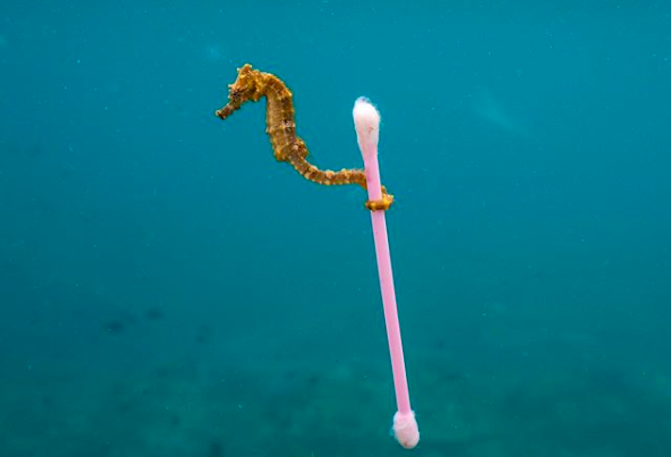While Indonesia possesses a vast wealth of marine biodiversity, marine pollution continues unchecked in much of the country’s waters (Indonesia is the world’s second biggest marine polluter after China, with its annual 3.22 million metric tons waste accounts for 10% of the world’s marine pollution).
This stunning photo by American photographer Justin Hofman sums up, in a single shot, the threat pollution poses to the archipelago nation’s marine life.
Hofman, an activist for US-based environmental conservation group Sea Legacy, recently snorkeled in the waters off of Sumbawa Island in West Nusa Tenggara. There, he snapped this underwater shot that is both adorable and disconcerting:
This is what Hofman wrote in the accompanying caption:
It’s a photo that I wish didn’t exist but now that it does I want everyone to see it. What started as an opportunity to photograph a cute little sea horse turned into one of frustration and sadness as the incoming tide brought with it countless pieces of trash and sewage. This sea horse drifts long with the trash day in and day out as it rides the currents that flow along the Indonesian archipelago. This photo serves as an allegory for the current and future state of our oceans. What sort of future are we creating? How can your actions shape our planet?
This photo eventually went viral both in Indonesia and globally, even making it to the front page of Reddit recently.
Speaking to Detik, Hofman said he took the photo after his friend, Richard White, spotted the unusual sight.
“We were snorkeling, while everyone else (on the island) were watching water buffaloes racing. I saw the seahorse near the surface of the water. I almost wouldn’t have taken this photo if it weren’t for the help of my friend with the sharp eyesight, Richard, who was the one who first saw this seahorse,” Hofman told Detik today.
Hofman said that he has often seen trash in Indonesia’s seas.
“I’m certain that some of the trash came from nearby cities. But it’s also possible that the trash came from various parts of Asia because there’s so much sea water (and particles) transported on a current through Indonesia’s waters,” he said.
“Since I work on a vessel and I’ve been around the world, I have seen many changes and problems towards our ecosystems. I have to contribute to change or this would all mean nothing.”




